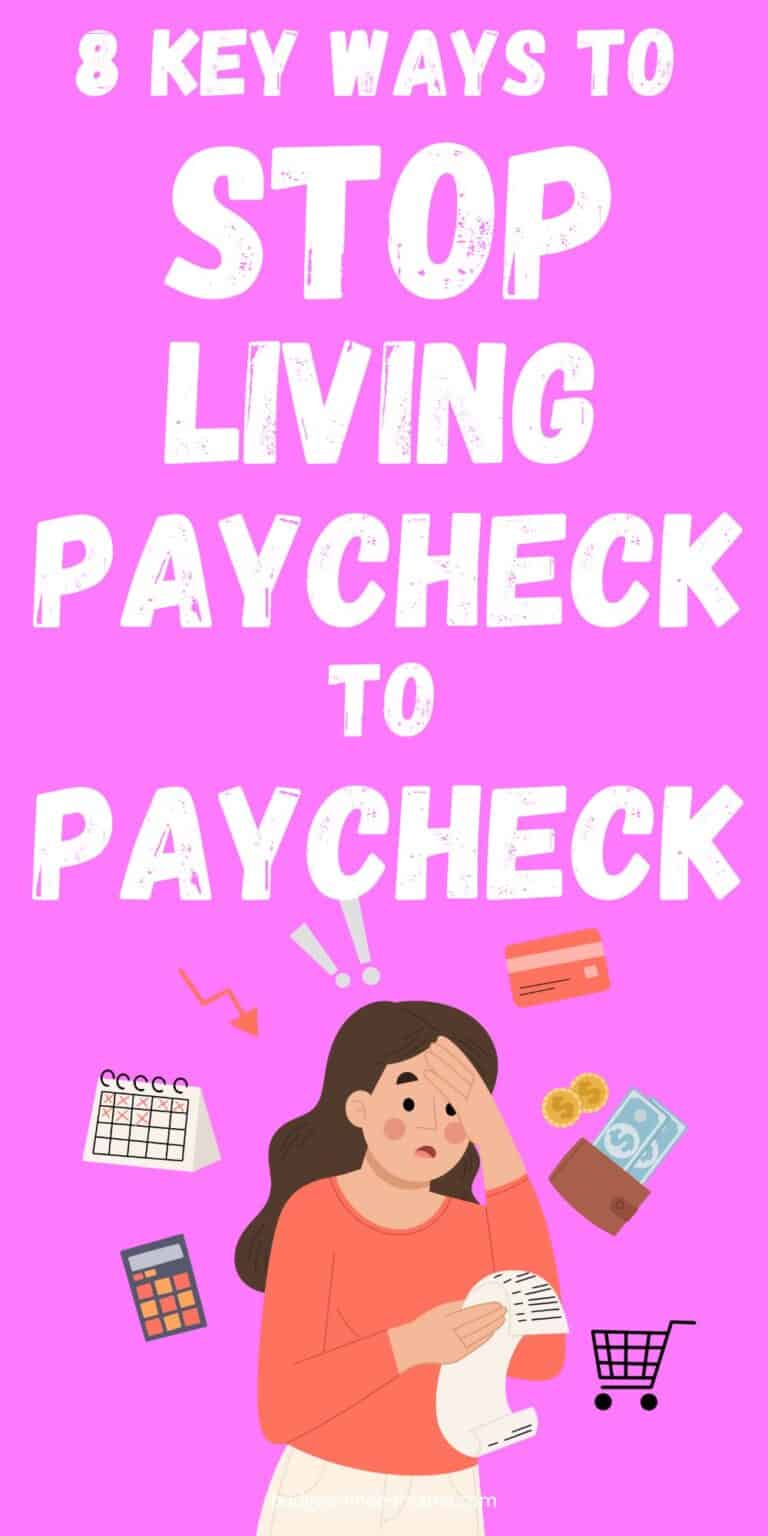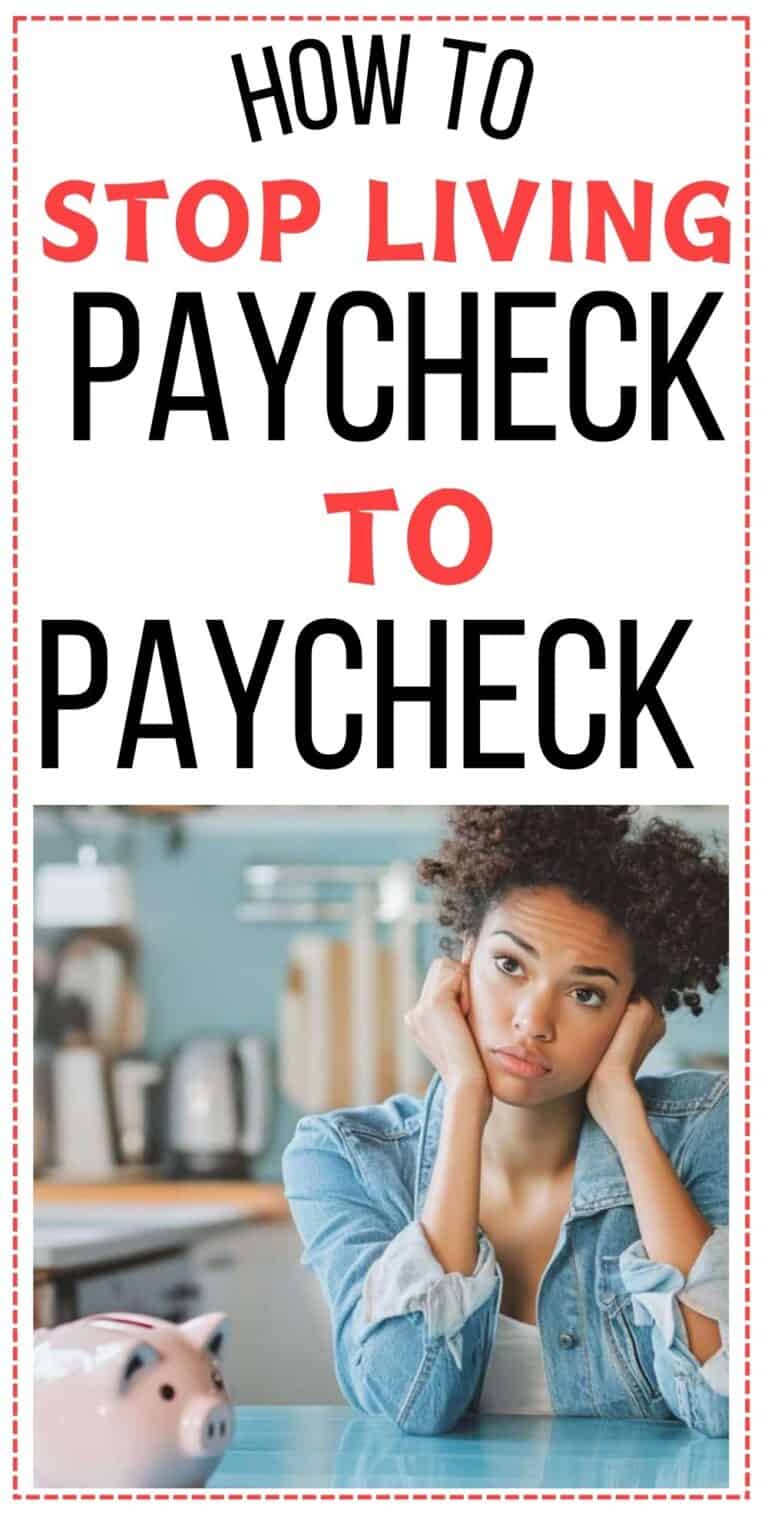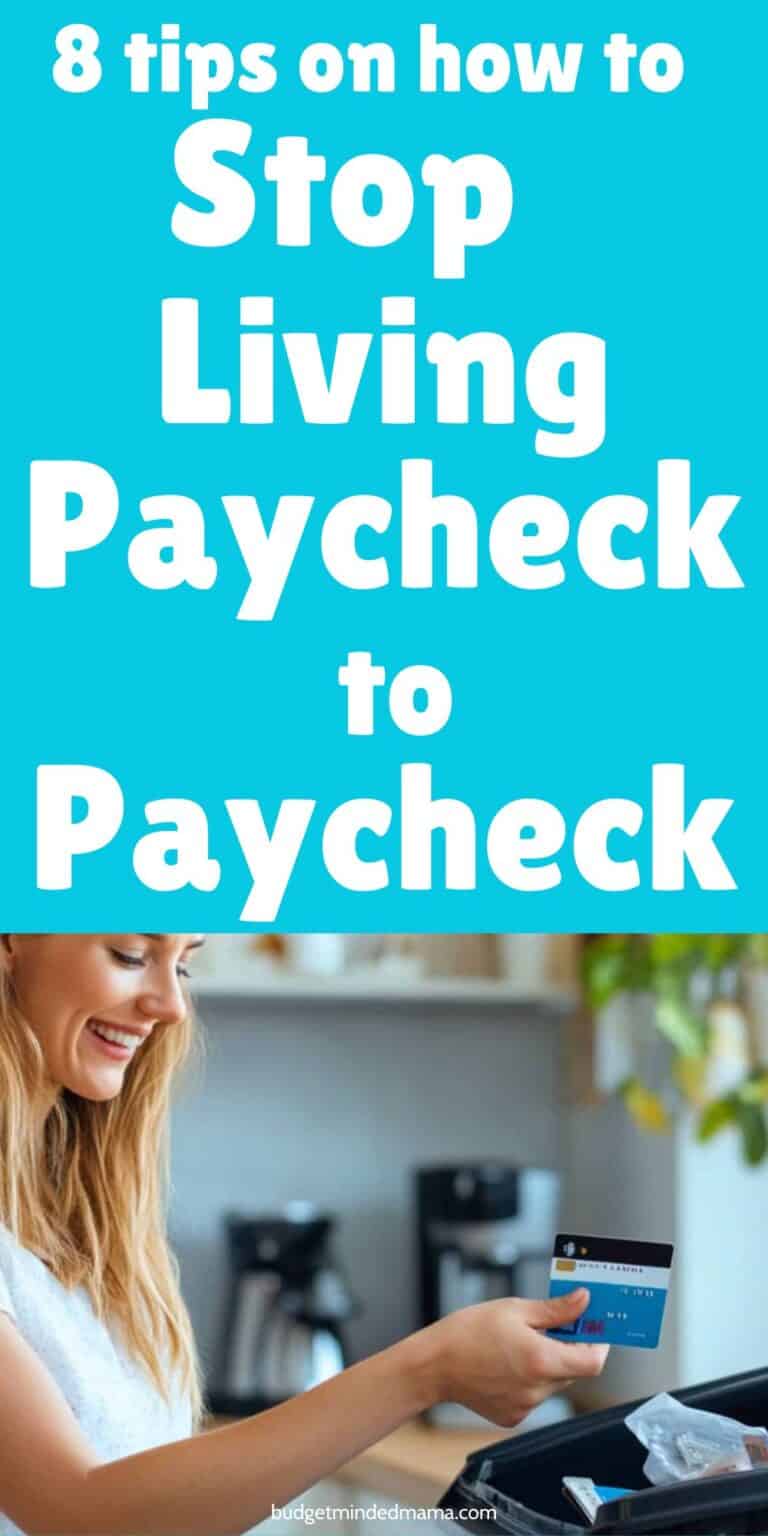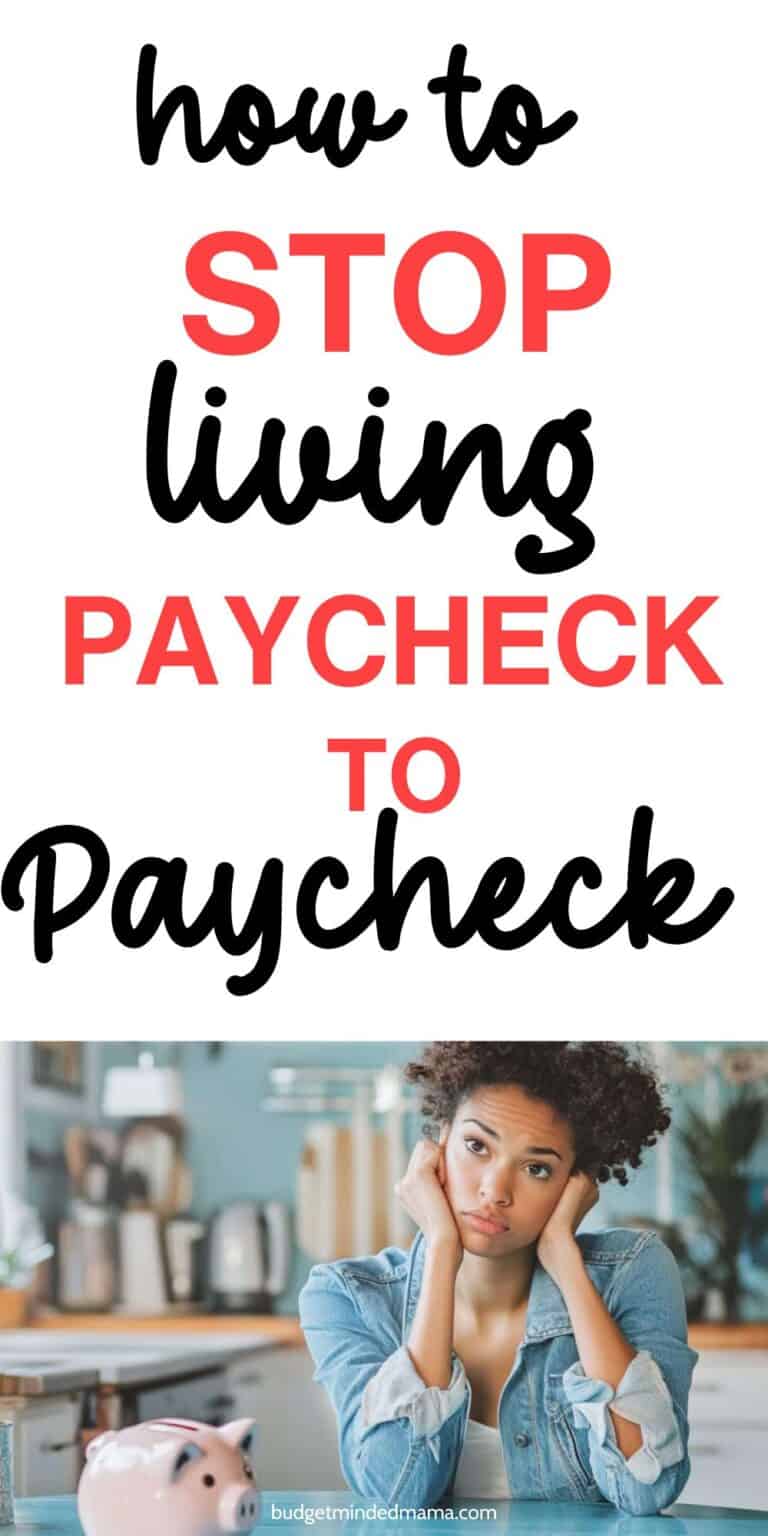I know how exhausting it is to feel like your money disappears the second you get paid.

Living paycheck to paycheck isn’t just stressful—it’s downright frustrating.
No matter how hard you work, it feels like you’re stuck in a cycle that won’t let up.
But breaking free from it isn’t about making huge sacrifices or winning the lottery.
Small, intentional changes can make a massive difference, and I’m here to show you how.
It’s not about depriving yourself—it’s about creating breathing room so you can actually enjoy your life.
Imagine having extra cash at the end of the month instead of scrambling to cover bills.
Sounds pretty great, right?
Let’s talk about how to make that your reality!
Find Out Where Your Money Is Going

Ever check your bank balance and wonder where all your money went?
You’re not alone—it happens to the best of us.
The first step to breaking the paycheck-to-paycheck cycle is knowing exactly where your money is going.
Track every dollar for a month, and I mean every dollar, even the quick coffee runs and late-night online shopping.
You don’t have to be perfect—just honest.
Look for patterns and see if there are any surprises (spoiler: there probably are).
Maybe subscriptions you forgot about, eating out more than you realized, or little impulse buys adding up.
The goal isn’t to feel guilty—it’s to get clarity so you can make better choices moving forward.
Build a Cushion (Even If It’s Small at First)

An emergency fund might sound impossible when you’re barely making it to payday, but even a small cushion can be life-changing.
Start tiny—$10, $20, whatever you can manage—and stash it somewhere separate from your spending money.
Even just having $500 saved means a minor car repair or unexpected bill won’t completely wreck your budget.
If you get any extra cash, like a tax refund or a side gig payment, put a little aside before spending it.
Automating savings is a game-changer—set it and forget it.
I know it’s hard to prioritize saving when it feels like there’s never enough, but every little bit adds up.
It’s not about how much you save at first—it’s about building the habit.
The peace of mind alone is worth it!
Cut Expenses Without Sacrificing Your Life

Cutting back doesn’t mean giving up everything fun—it’s about spending smarter.
Start with the easy stuff:
- cancel subscriptions you don’t use
- renegotiate bills
- shop around for better deals on things like insurance or phone plans
Meal planning can save a ridiculous amount of money, and no, it doesn’t have to mean eating the same thing every day.
Find free or low-cost entertainment—libraries, community events, and streaming services have so much to offer.
If you love going out, set a budget for it so you’re in control instead of feeling guilty later.
Small swaps—like making coffee at home or using cashback apps—can add up fast.
The goal isn’t to feel deprived, just more intentional with your spending.
You’ll be surprised how much money you free up when you start making little changes.
Increase Your Income

Sometimes, cutting expenses isn’t enough—you need more money coming in.
Asking for a raise might feel intimidating, but if you’re a valuable employee, it’s worth a conversation.
Side hustles can be a great way to bring in extra cash, and they don’t have to take over your life.
Sell things you don’t use, pick up freelance work, or look into gig economy jobs that fit your schedule.
If you have a skill people will pay for—writing, tutoring, crafting, social media—there’s probably a way to monetize it.
Even picking up a few extra shifts here and there can help build some financial breathing room.
The key is finding something that works for you and your lifestyle.
More income means more options, and more options mean less stress.
It might take time, but even a little extra cash can help shift things in the right direction.
Pay Off Debt (So Your Money Works for You, Not Lenders)

Debt can feel like a never-ending weight, but the sooner you start tackling it, the more freedom you’ll gain.
Focus on high-interest debt first—credit cards, payday loans, anything draining your money with crazy interest rates.
The snowball method (paying off small debts first for quick wins) and the avalanche method (paying off high-interest debts first) both work—pick what keeps you motivated.
Making extra payments, even small ones, helps more than you think.
If possible, negotiate lower interest rates or look into balance transfers to save money.
Try not to add new debt while you’re paying things down, unless it’s unavoidable.
Debt doesn’t define you—it’s just a challenge to work through.
Every dollar you put toward paying it off is a step toward financial freedom!
Make a Simple Budget You Can Actually Stick To

Budgets get a bad reputation, but they’re really just a plan for your money—one that lets you tell your money where to go instead of wondering where it went.
You don’t have to track every penny if that stresses you out, but having a system helps.
Some people love zero-based budgeting (giving every dollar a job), while others prefer the 50/30/20 method (needs, wants, and savings).
Pick something that fits your personality so you’ll actually stick with it.
Make room for fun—if you cut out everything enjoyable, you’ll resent your budget and abandon it.
Adjust as needed—budgets aren’t set in stone, and life happens.
The goal is to create freedom, not restriction.
When you know where your money is going, it’s easier to make progress without feeling deprived.
Set Goals That Keep You Motivated

Saving money just for the sake of it isn’t exciting—having a clear goal is.
What does financial freedom look like for you?
Maybe it’s getting out of debt, traveling more, or finally feeling like you’re in control of your money.
Break big goals into small, achievable steps so you can celebrate progress along the way.
For example, instead of “I want to save $10,000,” start with “I’ll save $500.”
Seeing progress keeps you motivated to keep going.
Write your goals down, set reminders, and track how far you’ve come.
It’s not about being perfect—it’s about moving in the right direction.
Even small steps add up to big changes over time.
Stay Consistent and Keep Adjusting

No one’s budget is perfect all the time, and that’s okay.
Unexpected expenses pop up, and sometimes life just happens.
The key is to adjust instead of giving up.
If you overspend one month, look at what happened and make changes for next time—no guilt, just learning.
Keep checking in with your finances regularly, even if it’s just once a week.
As your income changes, adjust your goals and spending habits accordingly.
The more consistent you are, the easier it gets.
Managing money isn’t about being flawless—it’s about being flexible and making progress.
The more you stick with it, the more financial freedom you’ll create for yourself!
Financial Freedom Starts with Small Steps
Breaking the paycheck-to-paycheck cycle isn’t about making huge, impossible changes overnight—it’s about small, consistent steps that add up over time.
The more you take control of where your money goes, the more freedom you’ll gain to spend, save, and live on your terms.
Some months will be easier than others, and that’s okay.
The key is to keep going, even when things don’t go perfectly.
Imagine what it would feel like to have breathing room in your budget instead of constantly stressing about the next bill.
That reality is completely possible for you.
Your future self will thank you for starting today!



